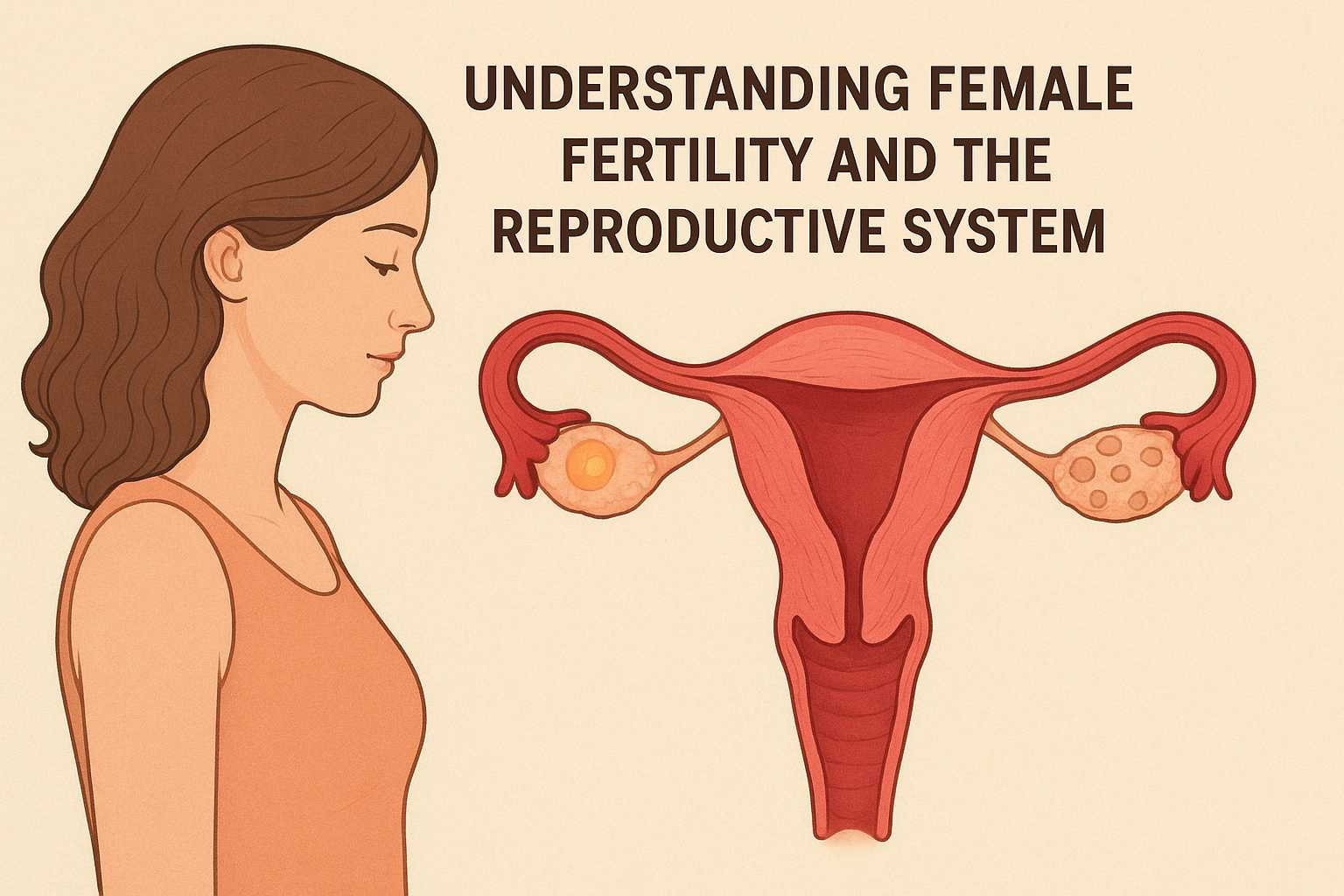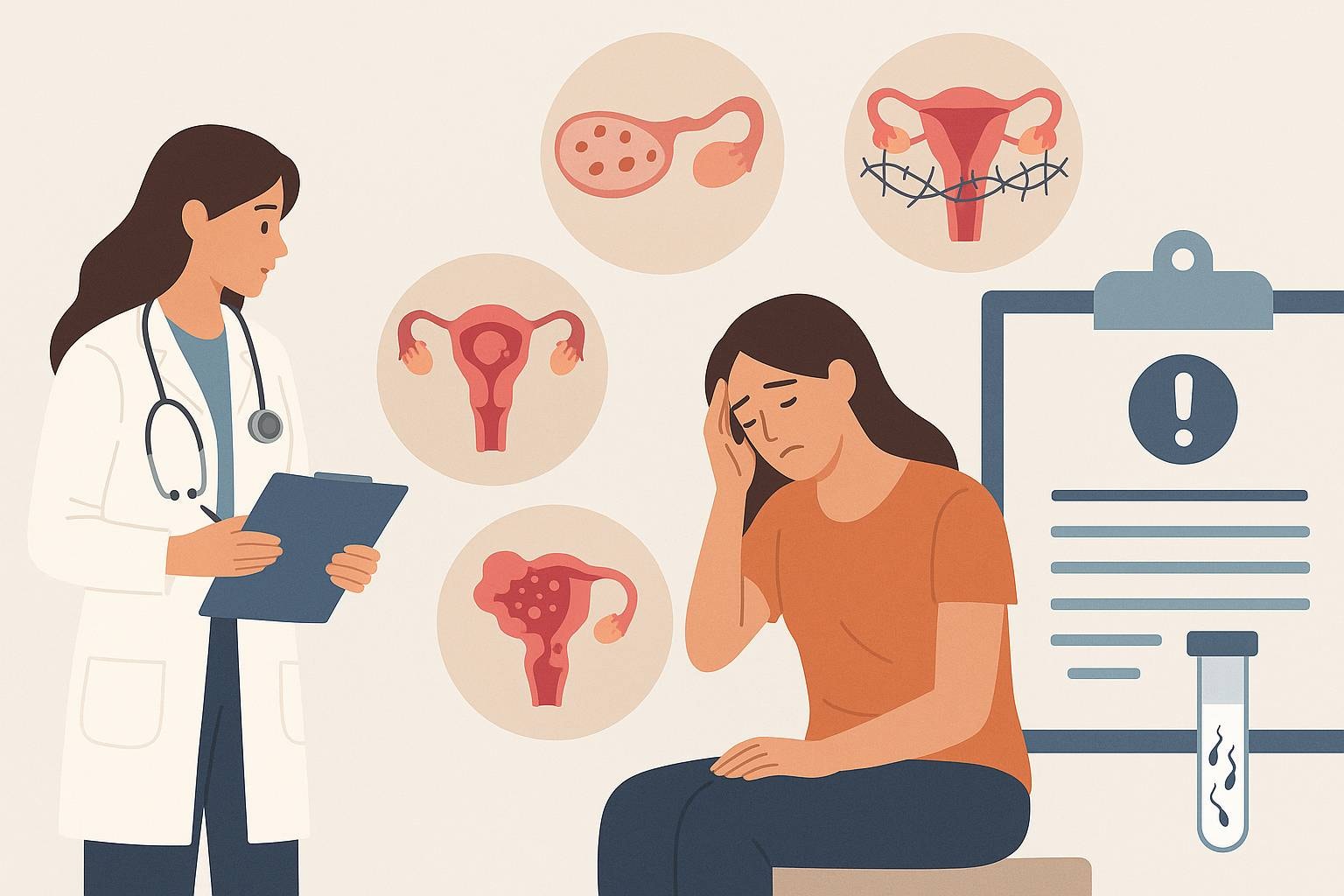Want to know how to boost fertility in females without draining your savings on expensive treatments? You’re in the right place.
Research from the American Society for Reproductive Medicine shows that lifestyle factors like diet, exercise, and reducing alcohol consumption can improve female fertility by up to 69% in some cases.
This guide walks you through clear, practical steps—covering food, habits, and timing—so you can focus on what really works.
Understanding Female Fertility and the Reproductive System

Knowing how to boost fertility in females starts with understanding the reproductive system. Your reproductive organs—like the ovaries, fallopian tubes, and uterus—work together to prepare for pregnancy.
Problems such as ovulation disorders, pelvic inflammatory disease, or polycystic ovary syndrome (PCOS) can negatively affect fertility and even cause female infertility.
Tracking your menstrual cycle and learning how the reproductive system functions can help you spot early signs of risk factors before they affect fertility. The pituitary gland controls important hormones that trigger ovulation and support the menstrual cycle.
Key Points:
- Ovaries release eggs (egg supply).
- Fallopian tubes carry the egg to the uterus.
- Healthy reproductive organs reduce risk of infertility.
- Common conditions like PCOS increase risk of fertility issues.
- Monitoring the menstrual cycle helps in predicting ovulation.
“Consult Dr. Anshu Agarwal, Ranchi’s trusted gynecologist with 18+ years of experience in fertility care. Book Your Appointment Today”
What Is Ovulation?
Ovulation is when your ovary releases a mature egg. This usually happens once in every menstrual cycle, about 12–16 days before your next period. The egg travels through the fallopian tubes, waiting to be fertilized by sperm.
If sperm count and sperm quality are healthy, fertilization can happen during this time. Problems like ovulation disorders or low ovarian reserve can affect fertility and even lead to female infertility. Knowing when ovulation occurs is the first step in planning for a successful pregnancy.
Timing Ovulation for the Best Chance to Get Pregnant
Timing matters. You are most likely to get pregnant during the fertile window—about 5 days before ovulation and the day of ovulation itself. A blood test or ovulation predictor kit can help track hormone changes. Watching for signs like changes in cervical mucus also helps predict ovulation.
Doctors say couples who plan sex around this fertile window have a much higher chance of achieving pregnancy compared to random timing.
Tips:
- Track your menstrual cycle monthly.
- Use ovulation kits for accuracy.
- Look for natural body signs (cervical mucus, basal temperature).
- Plan intimacy during your fertile days.
“Struggling with infertility? Dr. Anshu Agarwal has helped 300+ women conceive naturally without IVF. Get Expert Guidance Now”
Nutrition for Female Fertility: Foods That Help and Harm

What you eat plays a big role in female fertility. Research from Harvard School of Public Health found that women who followed a fertility-focused diet had a 66% lower risk of ovulatory infertility.
Good food choices can support the reproductive system, while poor ones can negatively affect fertility. Let’s look at foods that help and foods that harm.
Foods That Help Female Fertility
1. Folic Acid–Rich Foods
- Folic acid is a B vitamin that helps your body make healthy cells. It also lowers the risk of neural tube defects during early pregnancy. Experts recommend women trying to get pregnant eat foods rich in folate like spinach, beans, and fortified cereals.
- According to the CDC, women who consume enough folic acid daily are less likely to face fertility issues and have a higher chance of a successful pregnancy.
2. Vitamin C and Citrus Fruits
- Vitamin C plays a key role in protecting eggs and improving ovarian reserve. Citrus fruits like oranges, lemons, and grapefruits are natural sources. They also help your immune system and improve blood vessels that carry nutrients to reproductive organs.
- One study published in Fertility and Sterility found that women with higher vitamin C intake had improved cervical mucus quality, which makes it easier for sperm to reach the egg.
3. High Fiber Foods
- Fiber helps your body manage insulin sensitivity and reduces the negative effects of a high glycemic index diet. Whole grains, oats, lentils, and vegetables keep your blood sugar stable, which supports healthy ovulation.
- Harvard research on women’s health showed that women who ate more fiber had a reduced risk factor for ovulatory infertility.
4. Healthy Fats and Lean Proteins
- Not all fats are bad. Healthy fats like those in avocados, nuts, and olive oil support hormone production and keep your reproductive system balanced. Lean proteins such as fish, eggs, and legumes provide building blocks for healthy cells.
- They also help maintain a healthy body and a healthy weight, which directly affects fertility. A healthy weight reduces the increased risk of female infertility and pregnancy complications.
Foods That Can Cause Female Infertility
1. Trans Fats
- Trans fats are found in fried snacks, fast foods, and processed baked goods.
- How they affect fertility: They increase insulin resistance and can negatively affect fertility by disturbing ovulation. Research shows that women who eat more trans fats have a higher risk of ovulation disorders and female infertility.
2. Processed Meat and Red Meat Excess
- Sausages, hot dogs, and too much red meat fall into this category.
- How they affect fertility: These foods may lower egg quality and even affect sperm count in partners, making male fertility weaker. High intake is linked to a greater risk factor for unexplained infertility.
3. Refined Carbohydrates
- White bread, white rice, pastries, and sugary drinks.
- How they affect fertility: These foods cause blood sugar spikes, lower insulin sensitivity, and may harm the ovarian reserve. A high glycemic index diet has been connected with reduced pregnancy rates and increased risk of female infertility.
4. Too Much Alcohol and Caffeine
- Regular alcohol consumption and high caffeine intake from coffee or energy drinks.
- How they affect fertility: Drinking too much can negatively affect fertility, increase the risk of ovulatory infertility, and lower chances of achieving pregnancy.
- The American Society for Reproductive Medicine advises women planning a clinical pregnancy to limit both alcohol and caffeine consumption for a successful pregnancy.
“Looking for safe, personalized fertility treatments in Ranchi? Connect with Dr. Anshu Agarwal—your partner in women’s health.”
Boost Fertility Naturally: Practical Steps You Can Start Today to Get Pregnant

1. Track Your Menstrual Cycle
Your menstrual cycle is the monthly rhythm of your reproductive system. It includes ovulation, the time when your ovary releases an egg.
How it helps fertility: By tracking your cycle, you can predict ovulation and find your fertile window. This is usually the five days before ovulation plus the day of ovulation itself.
Practical steps:
- Use a mobile app or a simple calendar.
- Watch for signs like changes in cervical mucus.
- Some women use a blood test or ovulation kit for more accuracy.
Tracking helps you avoid guessing and reduces the risk factor of missed opportunities to get pregnant.
2. Eat a Fertility-Friendly Diet
What you eat can support or harm female fertility. Foods rich in folic acid, vitamin C, citrus fruits, and high fiber foods are proven to help.
How it helps fertility: A healthy diet improves insulin sensitivity, balances sex hormones, and reduces the increased risk of ovulatory infertility.
Practical steps:
- Add leafy greens, beans, and fortified grains for folic acid.
- Eat citrus fruits for vitamin C and better ovarian reserve.
- Replace refined carbohydrates with whole grains.
- Limit alcohol consumption, caffeine intake, and trans fats, which can negatively affect fertility.
As Harvard researcher Dr. Jorge Chavarro explains: “Dietary changes alone can cut the risk of ovulatory infertility by up to 80%.”
3. Keep a Healthy Body & Maintain a Healthy Weight
A healthy body supports both reproductive organs and hormone balance. Being underweight or overweight can affect fertility.
How it helps fertility: Studies show that women who maintain a healthy weight have higher pregnancy rates and lower chances of pregnancy complications. Excess weight may increase the risk of ovulation disorders and insulin resistance.
Practical steps:
- Aim for moderate physical activity like walking or swimming.
- Focus on a balanced, healthy diet instead of crash diets.
- Get regular health checkups to rule out polycystic ovary syndrome or other conditions that may affect fertility.
Maintaining a healthy weight is one of the most powerful steps you can take for a successful pregnancy.
4. Stay Active with Moderate Physical Activity

Moderate physical activity means simple exercise like walking, swimming, yoga, or cycling.
How it helps fertility: Exercise helps you keep a healthy weight and a healthy body. Being overweight or underweight can cause ovulation disorders, insulin resistance, and other conditions that negatively affect fertility. Regular activity also balances sex hormones and supports the reproductive system.
Practical steps:
- Aim for 30 minutes of moderate physical activity at least 5 times a week.
- Avoid extreme workouts, which can increase the risk factor for female infertility.
- Pick something you enjoy, so it feels natural and easy to continue.
5. Limit Alcohol and Caffeine Consumption
Alcohol consumption and high caffeine intake from coffee, soda, or energy drinks.
How it affects fertility: Drinking too much can cause pregnancy complications, lower pregnancy rates, and even affect sperm quality in men.
High caffeine consumption is linked to a higher risk of ovulatory infertility. The American Society for Reproductive Medicine advises limiting both alcohol and caffeine if you’re trying to get pregnant.
Practical steps:
- Keep alcohol intake as low as possible.
- Limit coffee to one small cup per day.
- Replace sodas or energy drinks with water, herbal teas, or fresh citrus fruits.
6. Support Male Fertility Too
Fertility is not only about women. Male fertility plays a big role in achieving pregnancy. Factors like sperm count, sperm quality, and healthy sperm are equally important.
How it helps fertility: About 30–40% of infertility cases are due to male infertility, according to the CDC. Issues such as alcohol consumption, processed meat, or smoking can negatively affect fertility in men. Supporting male reproductive health improves overall fertility chances.
Practical steps:
- Encourage your partner to eat a healthy diet rich in vitamin C, folic acid, and high fiber foods.
- Limit alcohol consumption and avoid smoking.
- Maintain a healthy weight and stay active.
- Get medical advice if sperm count or quality is low.
7. Manage Stress and Sleep Well
Stress and poor sleep can affect fertility. High stress raises cortisol levels, which can disturb sex hormones and the menstrual cycle. Lack of sleep may also increase risk factors for ovulation disorders and female infertility.
How it helps fertility: Good sleep supports your reproductive system and keeps your body balanced. Stress management lowers the chances of conditions that negatively affect fertility, like insulin resistance and pregnancy complications.
Practical steps:
- Aim for 7–8 hours of sleep each night.
- Try deep breathing or yoga to manage stress.
- Cut down on screen time before bed.
- Talk to a doctor if stress feels overwhelming.
Everyday Habits That May Affect Fertility

- Skipping Breakfast or Eating Poorly: What you eat affects your reproductive system. Skipping meals or relying on processed foods may disturb your hormones and menstrual cycle, which can directly affect fertility. A balanced diet with whole grains, fruits, and lean proteins supports your healthy body and increases your chances to get pregnant.
- Stressful Daily Routine: Chronic stress raises cortisol, which can disturb sex hormones. According to the American Society for Reproductive Medicine, high stress can lower pregnancy rates by up to 30%. Managing stress with yoga, meditation, or even short walks helps restore balance and improve successful pregnancy chances.
- Excess Screen Time and Environmental Factors: Spending long hours on screens and sitting too much not only affects your posture but also harms insulin sensitivity. Poor insulin balance is linked to polycystic ovary syndrome, which is a major cause of ovulatory infertility. Limiting screen time and staying active with moderate physical activity can protect your reproductive organs and hormone health.
- Using Birth Control for Too Long Without Breaks: Long-term birth control use can sometimes delay when your natural fertility begins again. While it doesn’t cause permanent damage, it may take months for your cycle to stabilize, which can affect fertility if you are already trying to get pregnant.
- Ignoring Regular Health Checkups: Skipping checkups can hide conditions like pelvic inflammatory disease or ovulation disorders that often go unnoticed but are known to negatively affect fertility. A simple blood test can identify issues early and help you take action before they become serious fertility issues.
- Neglecting Hydration: Not drinking enough water can make your cervical mucus thicker. This makes it harder for sperm to reach the egg. Staying hydrated improves your overall healthy body and supports a stronger reproductive system.
- Too Much Exposure to Heat: Frequent hot baths, saunas, or even heated laptop use near the abdomen can negatively affect fertility. Excess heat may damage egg supply or disturb hormone balance. Protecting your reproductive organs from heat exposure is a small but powerful step to boost fertility naturally.
Medical Conditions Linked to Fertility Issues

1. Polycystic Ovary Syndrome (PCOS)
PCOS is a hormonal condition where the ovaries make more androgens (male hormones) than normal. This can stop regular ovulation.
How it affects fertility: PCOS is one of the leading causes of ovulatory infertility. Women with PCOS often face irregular menstrual cycles, weight problems, and insulin resistance. These can all negatively affect fertility and raise the risk factors for diabetes or pregnancy complications.
Tip: A doctor may suggest lifestyle changes, moderate physical activity, or fertility treatment like medications to help stimulate ovulation.
2. Ovulatory Infertility
This happens when your ovaries don’t release eggs regularly. It may be due to hormone imbalances, stress, or other conditions.
How it affects fertility: Without ovulation, pregnancy cannot happen. This condition explains nearly 25% of female infertility cases worldwide (World Health Organization).
Tip: Tracking your menstrual cycle and using a blood test to check hormone levels can help find the cause early.
3. Low Ovarian Reserve
This means your ovaries have fewer healthy eggs left. It’s often linked to age but can also come from genetics or medical issues.
How it affects fertility: A low ovarian reserve lowers egg quality, making it harder to get pregnant. It also increases the chances of fertility issues and may reduce success with in vitro fertilization.
Tip: Doctors may check your ovarian reserve with tests like AMH or ultrasound. If it’s low, they might suggest early planning for a successful pregnancy.
4. Blocked or Damaged Fallopian Tubes
The fallopian tubes carry eggs from the ovaries to the uterus. If they are blocked or damaged, the egg cannot meet sperm.
How it affects fertility: This condition is a major cause of fertility issues. It can lead to trouble while trying to get pregnant and may increase the risk factors for in vitro fertilization failure.
How to manage: Doctors may use imaging tests or a simple blood test to check for damage. In some cases, surgery or fertility treatment like IVF may be suggested to improve chances of a successful pregnancy.
5. Pelvic Inflammatory Disease (PID)

PID is an infection in the reproductive organs, often caused by untreated sexually transmitted infections.
How it affects fertility: It can scar the fallopian tubes, cause chronic pain, and negatively affect fertility. The CDC notes that 1 in 8 women with a history of PID has difficulty getting pregnant.
How to manage: Early treatment with antibiotics can prevent damage. Regular health checkups are vital to avoid increased risk of long-term problems.
6. Unexplained Infertility
Sometimes all tests come back normal, yet pregnancy doesn’t happen. This is called unexplained infertility.
How it affects fertility: Doctors may not find clear causes, but factors like stress, subtle hormone changes, or lifestyle habits may still affect fertility. This is frustrating but common—studies suggest it accounts for nearly 15–30% of female infertility cases.
How to manage: Even if the cause is unclear, treatments like fertility medications, lifestyle changes, and moderate physical activity can help couples boost fertility naturally while planning advanced steps like assisted reproductive technology.
7. Endometriosis
Endometriosis happens when tissue, similar to the lining of the uterus, grows outside the uterine cavity. This can block the fallopian tubes or cause inflammation in the reproductive system.
Studies show that about 30–50% of women with endometriosis face female infertility. It can also negatively affect fertility by making it harder for the egg and sperm to meet.
What to do:
- A doctor may suggest fertility treatment like in vitro fertilization (IVF).
- Pain management and surgery can also help improve chances to get pregnant.
- Regular health checkups are important to detect the condition early.
8. Thyroid Disorders
Both underactive (hypothyroidism) and overactive (hyperthyroidism) thyroid can affect fertility. These disorders disturb sex hormones, ovulation, and the menstrual cycle. Women with thyroid problems may face an increased risk of pregnancy complications if left untreated.
What to do:
- A simple blood test can check thyroid levels.
- With the right medications, female fertility often improves.
- Doctors recommend not ignoring symptoms like fatigue, irregular periods, or sudden weight changes
9. Chronic Conditions and Autoimmune Diseases
Chronic illnesses like diabetes, or autoimmune diseases such as lupus, can affect fertility in females. They may damage reproductive organs, lower ovarian reserve, and increase risk factors for female infertility.
According to research, these conditions can also reduce pregnancy rates unless managed well.
What to do:
- Manage chronic illness with regular care and healthy lifestyle factors.
- Doctors may suggest folic acid supplements to support a successful pregnancy.
- In some cases, assisted reproductive technology like IVF may be needed.
Male Fertility and Its Impact on Female Conception

Understanding sperm count, healthy sperm, and sperm quality
When talking about how to boost fertility in females, male fertility plays an equally big role. Doctors say almost 40% of infertility cases involve male factors too. That means improving sperm health can directly help couples get pregnant.
Sperm Count: Sperm count means the number of sperm in one sample. A healthy sperm count increases the chance of the sperm reaching the egg. Low sperm count can affect fertility and make conception harder.
Healthy Sperm: It is not only about numbers. Healthy sperm should swim well, look normal, and have strong DNA. According to the World Health Organization, sperm that move quickly are more likely to cause a successful pregnancy.
Sperm Quality: Good sperm quality combines three things:
- Normal shape
- Strong movement
- Good volume
How Men Can Improve Fertility:
- Eat a healthy diet rich in fruits, vegetables, and protein.
- Avoid smoking, too much alcohol consumption, and processed foods.
- Exercise with moderate physical activity to maintain a healthy body.
- Do a simple blood test if you suspect problems with sperm quality or count.
“Both partners share the journey of achieving pregnancy, so taking care of male fertility is just as important as female fertility.”
When to Consider Fertility Treatments

Sometimes natural steps are not enough. If you have been trying to get pregnant for over a year without success, it may be time to talk to a doctor.
Women over 35 should consider seeking help after six months. Fertility problems can have many causes, from ovulation disorders to blocked fallopian tubes.
Doctors may suggest different options based on your condition:
- Fertility medications: These drugs help stimulate ovulation. Some work by balancing sex hormones like estrogen and progesterone. Others, such as clomiphene citrate, help release eggs from the ovaries.
- Intrauterine insemination (IUI): In this procedure, healthy sperm is placed directly inside the uterus. This increases the chances of meeting the egg.
- In vitro fertilization (IVF): Eggs are taken from the ovaries and fertilized in a lab. The embryo is then placed in the uterus. IVF is often used when there are severe fertility issues or low sperm quality.
Doctors may also run tests like a blood test to check hormone levels, including follicle stimulating hormone and luteinizing hormone. These hormones play a key role in egg release and the health of the ovarian follicle.
"From PCOS to high-risk pregnancies, Dr. Anshu Agarwal provides holistic care every step of the way. Schedule a Consultation”
Conclusion
Knowing how to boost fertility in females is not about one magic step. It’s about small, steady changes in your daily life. Eating a healthy diet, staying at a healthy weight, and getting enough sleep can improve female fertility and reduce the risk of problems.
Medical conditions like polycystic ovary syndrome or ovulation disorders may also affect fertility, so regular checkups are important.
If you’ve been trying to get pregnant for a year without success, doctors may suggest fertility treatment such as fertility medications or even in vitro fertilization. Remember, both female infertility and male fertility matter. As one study notes, “About 40% of infertility cases involve men.”
Stay positive. With the right care, many couples move from infertility to a successful pregnancy. Your journey may take time, but every step brings you closer to your goal.

.jpg)
.jpg)

.jpg)


